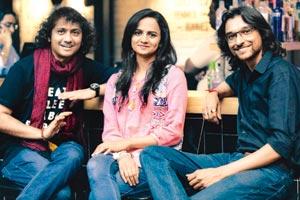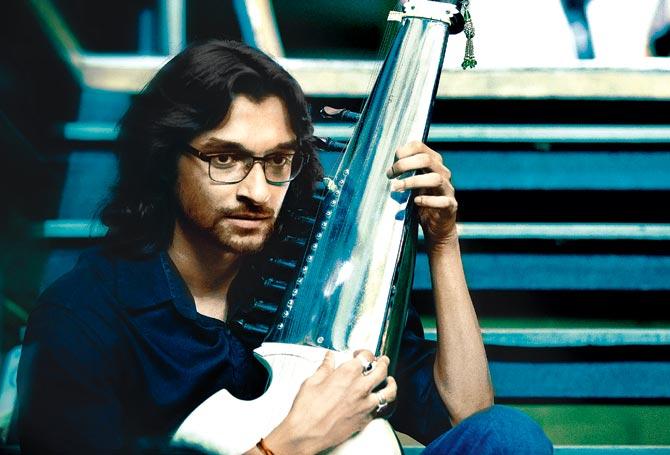Three young musicians will don jeans and tees and present a pure Hindustani classical music concert


Ojas Adhiya, Nandini Shankar and Abhishek Borkar are poised to strike a chord with young urban listeners in Mumbai
For most youngsters, unfamiliar with Hindustani classical music, 'serious', 'formal' and 'boring' are popular adjectives used to define the genre. For as long as we can remember, Hindustani classical, that has given the world several legends, has been performed in sprawling auditoriums — there's not just discipline in the music, but in the attire and in environment as a whole. How would it be then, to see classical being performed in casuals? Turns out, that's not an outrageous thought anymore. First Edition Arts, a Mumbai-based performing arts company is poised to topple status quo with the sole aim of gathering more young, urban listeners. Under a musical series called Come Together, three young Hindustani classical musicians, will slip into casuals and perform for an audience gathered at Cafe Zoe. Starting June 10, this will be a regular series, one in every quarter. While the setting is all-new, the music won't take the fusion route. The first series will feature Abhishek Borkar on the sarod, Nandini Shankar on the violin and Ojas Adhiya on the tabla. The trio will present an instrumental concert in both solo and duet sets.
Catch them young
"When younger musicians try to strike a rapport with young listeners they take the fusion route. We are saying, you don't have to. This music is so exciting on its own, that the young can be hooked," says Devina Dutt, director, First Edition Arts. Six months ago, they had organised something similar at antiSOCIAL at Khar as an experiment, and they were sold out. "We weren't sure of what to expect. But it was a success." That gave them the impetus to take the idea on a larger scale. "The first two sets will be the sarod and tabla. In the third set, Abhishek will invite Nandini to jam with them on stage. The concert will span a little over an hour — not the standard two-and-a-half-hour performance. Young people haven't even heard classical music and they have discarded it. All we are trying to do, is give them a sense of how exciting and rigorous it is. But, in a short dose," Dutt says.

Abhishek Borkar
The protocols will be relaxed too. The bar will be open before and after the concert, and for 20 minutes during the interval. Food and drink services will be terminated during the performance, but, once served, guests can continue with their meal at their tables. "There was no sense in locating it in a space like this and sticking to the rigidity. But, at the same time the character of the music does require attention, it's not the kind that you can hear in the background," she adds.
Break the rules
Ever since the posters of the concert went out, a lot of Shankar's friends and followers on social media have shown interest. The posters, with their vibrant colours and friendly fonts, could well be mistaken for one for a standup gig. "Any new genre is an acquired taste. Over the last couple of years, I have noticed an increase in my young audience. Young listeners are always looking for something new and because most of them have not heard classical music, it is novel to them. If they are exposed to it, they will enjoy it," says the eighth generation violinist. The set-up, she believes, needs to change because "it is important that it appeals to you at first go. That's why the colourful posters. We need to speak the language they understand," adds the 25-year-old. After the concert, the audience can interact with the artists as well. "The milieu becomes more relatable, it's like hanging out with friends. That becomes easier when the age groups are similar. We want to connect on a personal level. In fact, that's the bit I am really looking forward to," adds Shankar.

Nandini Shankar
Tabla ace Adhiya would love to do a Q & A with the audience as well. "That way we can reach out to them and explain what classical music is all about. If they know a few things, they can enjoy it more. And it will all be done in an informal manner," says the 30-year-old who made it to the Limca Book of World Records as the youngest tabla player at the age of 4. Borkar points out that traditionally, Hindustani classical has always been somewhat "intimidating".
"It can appear too proper, rigid and posh, with its sherwanis and bandhgalas. Sometimes I feel even the artists themselves enjoy this air of exclusivity that further distances them from the audience," says the 25-year-old sarod player, adding that he was thrilled about the prospect of performing in casuals. "That's what I wear when I practice or record in a studio. So, why not at a concert? We are even thinking of getting some people to sit on stage if possible," he adds.
Distraction not a concern
The trio believes that the music will be enough to keep people from getting distracted. "It's a new thing for them too, to experience this kind of music in the given setup. And if someone is quietly eating and drinking at their table, that should not bother me. In the olden days, there would be baithaks in people's homes, where classical concerts would be performed. It's the same concept," Adhiya says. Spontaneity will be the key on D-day; the artists will reach the venue, gauge the crowd and accordingly choose the raagas. Borkar says, "I love getting people interested in an instrument they have not seen or heard before. The idea is that if they don't come to our concerts, why don't we go where they hang out? And just because it's unusual that doesn't mean it's wrong."
Catch up on all the latest Mumbai news, crime news, current affairs, and also a complete guide on Mumbai from food to things to do and events across the city here. Also download the new mid-day Android and iOS apps to get latest updates
 Subscribe today by clicking the link and stay updated with the latest news!" Click here!
Subscribe today by clicking the link and stay updated with the latest news!" Click here!









